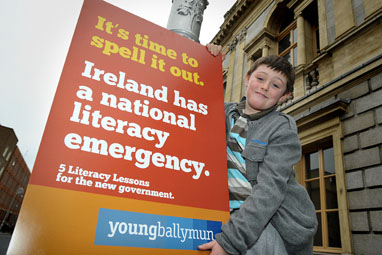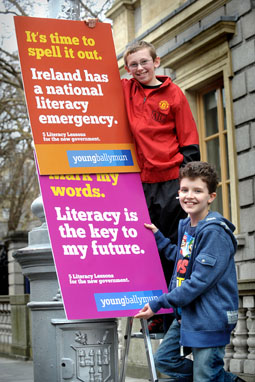Put Reading Power First says youngballymun
Resource type: News
Youngballymun |
 We have a national literacy emergency as well as an economic emergency – and one won’t be fixed without the other – is the message of youngballymun, making its election call to all political parties to put reading power first.
We have a national literacy emergency as well as an economic emergency – and one won’t be fixed without the other – is the message of youngballymun, making its election call to all political parties to put reading power first.
Launching its 2011 Literacy Manifesto, youngballymun recommends an increase in the amount of teaching time spent on literacy to a mandatory 2 hours a day. International research finds that primary level children receive an average of 55 minutes a day on direct reading and language instruction whereas 120 minutes (2 hours) at least is necessary to advance literacy.
It also recommends the introduction of a national literacy curriculum so that every minute counts in tackling the language and literacy needs of all children and particularly those from disadvantaged backgrounds who are at most risk in this emergency.
Eleanor McClorey, Director of youngballymun, said that the reality is that poor children are not learning to read to their ability. Our national literacy deficit is intrinsically linked to poverty and this hasn’t happened by chance, she said.
Research carried out by a US based youngballymun adviser highlights the gap that exists between children from different backgrounds. Children from low-income households can be up to 1½ years behind their middle-class peers in language ability when they start school.
“We are passively witnessing a literacy disaster,” McClorey said. “If political parties are serious about creating a fairer Ireland, and if they are serious about national recovery, they must act decisively to prioritise the basic life skill that is literacy for all children.”
“We are calling on the next Government to put reading power first, she continued. “The cost of solving our literacy problem is far less than turning away from it.”
Between 2000 and 2009, Ireland has dropped spectacularly from 5th to 17th place in the literacy rankings of 39 countries. The December 2010 PISA study put Ireland among the “average” performing countries in literacy at 17th place and among the “below average” countries in numeracy in 26th place.
McClorey stressed that literacy learning can happen everywhere. A national literacy plan must start from birth by investing in the language and literacy skills and understanding of children’s families and community services in addition to critical teacher investment.
The youngballymun Manifesto is a submission to the Department of Education and Skills’ policy document Better Literacy and Numeracy for Children and Young People. Its recommendations are rooted in emerging evidence from youngballymun services as well as tried and tested international learning. youngballymun welcomes the Department’s positive move to tackle Ireland’s literacy emergency.
5 Literacy Lessons for the New Government
1. Ireland is in a National Literacy Emergency
- Ireland hasn’t a hope of surviving and thriving while it is dragged down by shocking literacy and numeracy ratings. Poor communities and children carry the greatest burden.
2. The teacher is literacy’s champion
- Establish the role of literacy mentors and literacy leaders for DEIS schools. Identify areas of most need for literacy mentors.
- Invest in and develop teacher training to ensure understanding of the dynamics of poverty and literacy.
- Develop an appropriately trained and integrated early years workforce.
3. Give more time. Deliver the right content.
- Ensure at least 120 minutes of classroom teaching a day to advance child literacy.
- Deliver an evidence-informed new literacy curriculum – word knowledge, fluency, reading comprehension and writing.
4. Literacy learning is everywhere.
- The solution isn’t just in the classroom. Families and communities must be invested in to enable them to support their children’s development. Literacy support begins at birth.
- Address literacy deficits that may accrue during school holidays.
5. Joined-up writing
- A new literacy solution will work best when all of the literacy players work together: the classroom, other child and family services, the home and the community.
Youngballymun is an Atantic grantee.
For more info:
http://www.youngballymun.org/